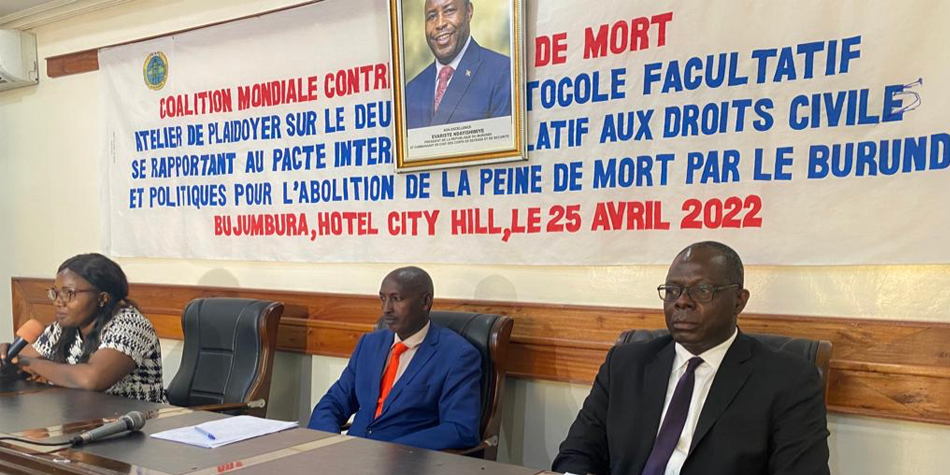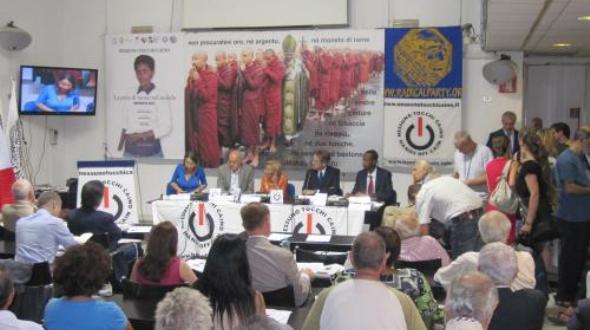
Burundi: Promising advocacy workshop for the ratification of the abolitionist treaty
Protocol
On April 25, 2022, the Burundian Prison Observatory (BPO) organized a one-day advocacy workshop on the ratification of the Second Optional Protocol to the International Covenant on Civil and Political Rights (OP2-ICCPR) with the support of the World Coalition Against the Death Penalty.
This workshop took place in Bujumbura, Burundi, with the participation of 36 actors, including NGOs, institutions, government officials, and journalists. Amongst the keynote speakers, Liévin NGONDJI ONGOMBE TALUHATA, President and Founder of the NGO Culture pour la Paix et la Justice located in the Democratic Republic of the Congo (DRC), representing the World Coalition, along with Dr. Carole Valérie NOUAZI KEMKENG, expert member of the African Commission on Human and Peoples’ Rights Working Group on Death Penalty, Extra-Judicial, Summary or Arbitrary Killings and Enforced Disappearances in Africa.
STATE OF RATIFICATION
The advocacy workshop began with the opening statements of the President of the BPO, Audace GAHIGA, of Liévin NGONDJI ONGOMBE TALUHATA and of Dr. Carole Valérie NOUAZI KEMKENG. They included an overview of the abolition of the death penalty in Burundi and the OP2-ICCPR ratification process. The death penalty was abolished from the Burundi domestic legal system by a 2009 law that reformed the penal code. It remains a legal sanction in the military code, but in practice the death penalty is not applied anymore. At the international level, the country has not yet ratified OP2-ICCPR, and on the contrary, Burundi has withdrawn from the Rome Statute, creating the International Criminal Court (ICC), a fundamental tool on the international stage.
Nevertheless, Burundi has already started the path to ratification. The instrument of ratification has already been adopted by the Parliament and was presented before the President of the Republic for promulgation in September 2020. Its failure to be promulgated therefore seems to reflect a political blockage. The text is now facing the foreclosure of the deadline, which according to the Constitution of Burundi should not exceed 48 hours after adoption by the Senate. The text must therefore go through Parliament again before it can be promulgated.
In addition to being a logical extension of its domestic commitment against the death penalty made in 2009, Burundi’s ratification of OP2 would aid the country in restoring its image on the international stage, which was tarnished following its withdrawal of the Rome Statute. Its commitment to abolition was weakened and questioned when the country voted against the UN General Assembly Resolution for a moratorium on the use of the death penalty in 2016, and was absent for the 2018 and 2020 votes, as recalled by Mr. Liévin NGONDJI ONGOMBE TALUHATA in his opening speech.
ON THE ROAD TOWARDS RATIFICATION
During the workshop, participants shared their concerns about the ratification process. The Covid-19 pandemic slowed down the ratification process, but according to them, the lack of legislator independence, the absence of political debate around the death penalty, and overall political instability since 2015 all constitute obstacles for the ratification of the protocol.
To overcome these problems, participants in the advocacy workshop were able to make various recommendations, which will be followed up by the Burundian Prison Observatory, with the crucial support of some other workshop participants.
Following the workshop, participants contributed to a radio program that was broadcasted locally, namely, to start building on their first recommendation- to raise awareness on the right to life. This program was an opportunity to hold a debate on the abolition of the death penalty in Burundi.
Categories
Burundi




